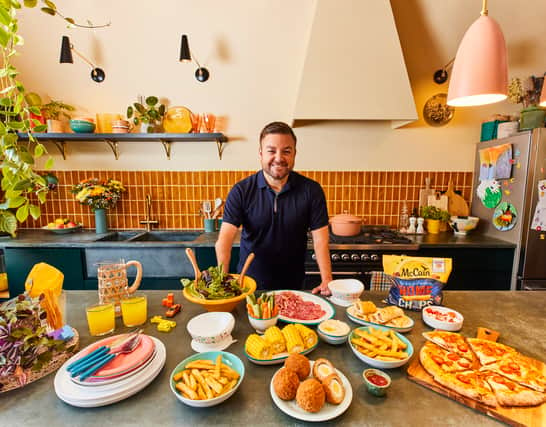Millions of adults admit they don't act themselves when in the company of someone disabled


And as a result, 57 per cent admit their unfamiliarity means they're afraid of saying the wrong thing or feel self-conscious of their behaviour (44 per cent).
While one in five have jumped in to offer help they weren't asked for and 14 per cent have made assumptions which may not be correct.
Advertisement
Hide AdAdvertisement
Hide AdOnly 12 per cent of families raising a disabled or seriously ill child say they are able to take part in all the social activities they'd like to, causing 83 per cent to feel sad, left out and frustrated.
The research, commissioned by McCain and grant-making charity Family Fund, also found one in six (17 per cent) have regretted how they've behaved around someone disabled - either in the way they have spoken, or by saying the wrong thing.
Of the 31 per cent of parent polled, 74 per cent would feel confident hosting a disabled child at their home for a playdate or an event, however, 23 per cent would be nervous having them over for dinner, with 38 per cent not thinking they're equipped to host a mealtime.
Following the study, McCain and Family Fund have collaborated with presenter and comedian Alex Brooker to promote more inclusive social occasions and launch a specially designed limited-edition scoop bowl.
Advertisement
Hide AdAdvertisement
Hide AdMark Hodge, from McCain Food UK&I, said: "Mealtimes are a crucial moment for friends and family to come together.
"This new data offers an important insight into why families raising a disabled or seriously ill child can feel excluded from such social occasions due to a lack of awareness of their child's needs, or embarrassment to ask for support for these needs.
"We want to make everyday meals more inclusive for everyone, so we're delighted ton have created this specially designed scoop bowl to ensure that families can better enjoy mealtimes together."
Breaking the barriers for family mealtime
Alex Brooker added: "This bowl is something I wished I had growing up; it's a great design and I think it will really help children feel more independent at mealtimes and give parents confidence to socialise more at social occasions."
Advertisement
Hide AdAdvertisement
Hide AdIt also emerged of those who don't know anyone disabled, 64 per cent admit to having little-to-no understanding of what day-to-day life is like for them.
However, 48 per cent would like to boost their own confidence when it comes to spending time with disabled people.
And 72 per cent of all respondent believed more public awareness is needed around what life is like for them.
Two thirds (64 per cent) suspected October half term could be a difficult time for families raising a disabled or seriously ill child as they could be less likely to be invited to social occasions by their friends.
Advertisement
Hide AdAdvertisement
Hide AdFamily Fund surveyed 1,202 families it has supported with a grant in the past nine to 12 months and found that 67 per cent had experienced friends and family being embarrassed to ask about any possible adaptions required so their disabled child could attend an event.
However, 63 per cent of families reckoned asking about their child's needs and preferences in advance would alleviate any need for concern ahead of a social occasion.
Cheryl Ward, chief executive of Family Fund, added: "Families raising a disabled or seriously ill child experience many barriers to participating in activities and events, due to the daily routines and equipment children need, continuous high costs and a lack of affordable inclusive opportunities.
"Creating inclusive mealtime moments in communities, and being aware of the challenges families face, can make a big difference to people's lives - with Alex shining a spotlight on this.
Advertisement
Hide AdAdvertisement
Hide Ad"We are now providing even more essential mealtime grants to families who need them most."
Advice from families supported by family fund on making social get-togethers more inclusive
- Don't be so afraid to ask families with disabled or seriously ill children over for meet-ups. Think inclusive, wherever possible, so no one is left out. Playdates can be just as important for parents - to reduce loneliness and isolation.
- Don't worry about asking families questions about a child's disability or condition and any adaptations we need, including what foods kids will eat, as diets can be restrictive.
- Talk with your kids about the fact that a disabled or seriously ill child might eat with their hands, need adaptations to eat or eat different types of food - the greater the awareness in other children, the more it prevents families feeling embarrassed or stared at, at get-togethers.
- Running through what will happen at get-togethers and what food you're planning, in advance with families, means they can prepare children and don't need to be embarrassed about asking questions whilst there.
- Be aware of individual sensory needs and think about the physical layout and safety of a party or playdate. Creating a quiet area or den, with low lighting and music, means children can take a break within social gatherings, or eat meals in a separate space.
Comment Guidelines
National World encourages reader discussion on our stories. User feedback, insights and back-and-forth exchanges add a rich layer of context to reporting. Please review our Community Guidelines before commenting.